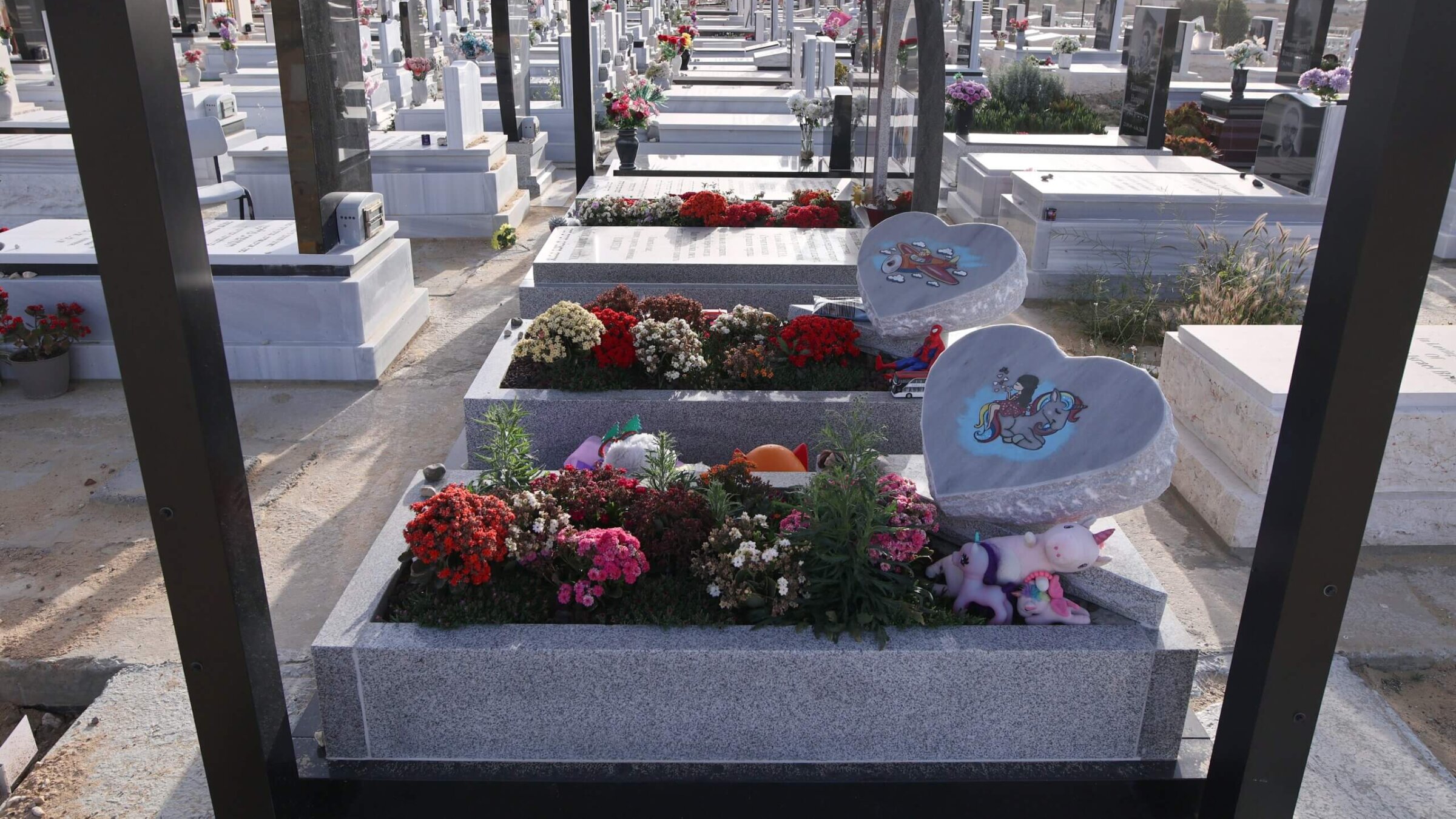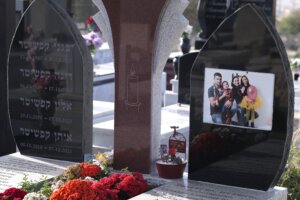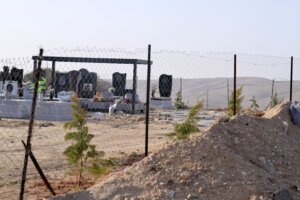‘Jewish enough to be murdered,’ but not buried in a Jewish cemetery
The rabbis in charge do not consider some victims of Oct. 7 Jewish — even though their families do

The graves of 8-year-old Aline Kapshitter and her 5-year-old brother, Eitan, outside the perimeter fence of the cemetery in Dimona. Photo by Ilan Assayag
This story was produced by Shomrim — The Center for Media and Democracy in Israel, a Tel Aviv-based independent, nonprofit investigative news organization. Shomrim, which works in partnership with other news outlets, sees investigative reporting as an essential tool for promoting democratic discourse and accountability in Israel. Click here to see the original, Hebrew version.
The Kapshitter family did not have a chance on Oct. 7. That Saturday morning the four members of the family — the father, Evgeny (Zhenya), 37, the mother, Dina, 34, and their two small children, 8-year-old Aline and 5-year-old Eitan — were on their way back to their home in Be’er Sheva from a camping trip near Ashkelon, when they were ambushed by Hamas terrorists, who sprayed their car with bullets, killing them all. The horrors did not end there. Identification of the bodies took many days, and was completed at different times for each of them, which meant their funerals could not take place at the same time. “An entire family was wiped out,” says Yana Pasternak, an old family friend. “Dina was shot in the head. Her face was unidentifiable. The grandmother identified the little boy,” and young Aline’s body was only located after she had been declared missing.
Their loved ones hoped the family would have dignity in death, but more emotional turmoil lay in store. Relatives and friends of the Kapshitter family were told that the four victims would not be buried next to each other in the cemetery in Dimona since Zhenya, the father, was not considered Jewish by the Chevra Kadisha burial society as his father was Jewish but his mother was not. Their relatives have not hid their anguish.
“Zhenya was Jewish enough to be murdered but not Jewish enough to be buried inside the cemetery,” said Pasternak. “It was so upsetting for us that an entire family was buried outside the fence.”
Zhenya and Dina immigrated to Israel in the mid-1990s and had lived there for more than 30 years. Dina and both of her children were recognized as halachically Jewish but Zhenya was not, like many other Jews who immigrated from the former Soviet Union, who were only Jewish on their father’s side. In the Soviet Union, if you had a Jewish father or even grandfather, you were considered Jewish. In Israel, the Law of Return, passed in 1950, gives people with one or more Jewish grandparents the right to acquire Israeli citizenship. This led to situations like that of Zhenya, who was recognized as Jewish according to the Law of Return but not necessarily according to Orthodox halacha. Now, the four graves, covered with flowers and toys, are located outside of the cemetery.
“We tried to explain to the rabbis responsible for the cemetery that Zhenya served in the army, that he gave everything to the State of Israel and that his father was Jewish — but to no avail,” Pasternak added. “They did not even listen. As far as they were concerned, he was not Jewish, period. It’s sad to say but I was not surprised. The state is completely blind to these problems.”
Shomrim inquired about the Kapshitter’s family case and others like it with the Ministry of Religious Affairs. It responded with a statement. “We have not received a single complaint from any of the families, apart from the incident in Beit She’an. There, too, everything was done in full coordination with the family and it was only two weeks after the funeral that someone tried to turn it into a story; in the end, it turned out that everything was fine. We are saddened that some people are trying to take the holy work that this ministry does and trying to hurt hundreds of people for no reason — all in the name of adversaries and enemies.”
Michael Pellivert, a political commentator who specializes in Eastern Europe and is himself a veteran immigrant from Georgia, said that such burial disputes are not a new problem, and one that has gotten worse since Oct. 7. “People are often ashamed to talk about this problem and to tell people that their relatives have been buried outside of the cemetery,” he said. “Most people who have lost a son, daughter or brother decide that this is not the main issue they want to focus on. They have to deal with the mourning.” But now, after almost six months of war, an increasing number of people are making their voices heard on the issue.

The IDF updates its rules
The IDF has ditched its practice of excluding the remains of people like Zhenya — but only after a scandal. In 2016, then-Defense Minister Moshe Ya’alon issued an order doing away with the practice of burying fallen IDF soldiers whose Judaism was under question in a separate section of the country’s military cemeteries. Ya’alon’s order came three years after a public outcry caused by then-IDF Chief of Staff Benny Gantz, who attended a memorial ceremony on Mount Herzl but did not pay his respects at the grave of Yevgeny Tolochko – who immigrated to Israel from Ukraine when he was 6. He was the most recent fallen soldier at the time but was buried in a separate section of the cemetery.
Now, in the aftermath of Oct. 7, Israelis who immigrated from the former Soviet Union are demanding a comprehensive rewrite of the laws. “It’s not just Russian speakers who need a solution; it’s the whole of Israeli society,” said Pellivert. “In the most concrete sense possible, we will not be a people until we resolve this issue.”
Members of the One Million Lobby, a nongovernmental organization which represents immigrants to Israel from the former Soviet Union, tried to raise the issue in the Knesset in the aftermath of Oct. 7. As CEO Alex Rif tells Shomrim, however, they were not successful. The government, she said, is not open to even discussing the issue, even though Likud Knesset members “apparently recognize the problem and agree that something must be done, but they do not want to work with the One Million Lobby to deal with it. There is only one Russian-speaking politician in the coalition — Yuli Edelstein — and there is simply no point in talking to him because, as chairman of the Foreign Affairs and Defense Committee, he mainly deals with other matters. So, issues that are important to Russian-speaking Israelis remain unaddressed.”
In the opposition ranks, the situation is different. Lawmakers who immigrated from the former Soviet Union and now represent parties such as Yesh Atid and Yisrael Beiteinu told Shomrim that they support changes to the current legislation. Knesset member Tania Mazarsky, of the Yesh Atid party, said she discussed the One Million Lobby proposal with Religious Affairs Minister Michael Malkieli, of the Shas party — but to no avail. This did not come as any surprise to representatives of the NGO, who point out that the Haredi parties in the coalition have, in the past, expressed their support for proposals to scale back the Law of Return, so that it only applies to people who have at least one Jewish parent, rather than one Jewish grandparent according to the current law. Scaling back the so-called Grandchild Clause was part of the coalition agreement between Likud and United Torah Judaism. If passed, it will have far-reaching implications for thousands of Israelis — the vast majority of them from the former Soviet Union.
‘There should be no segregation’

Alina Falahati, who was 21 when she was murdered on Oct. 7, was born in the Russian enclave of Kaliningrad and moved to Israel with her family when she was 3. She attended the Nova music festival with her partner, Yoni. They drank and danced until the Hamas assault began — and both were murdered. At first, Alina was thought to be missing or kidnapped. Three weeks later her scorched remains were located under an ambulance. The family, hoping for good news, got a small bag with what remained of Alina’s jewelry. A stone was placed on her grave, with her name in Russian and Hebrew, alongside a photograph of her as a young girl, with a cat perched on her shoulder. A video was posted after her death. In it, Alina looks into the camera and says: “Shalom, I want to tell you the story of my life. I am here for you, with love. I believe in God; I believe in the world.”
Alina finished her military service shortly before her death. She had been in the middle of the official conversion process, but the burial society refused to bury her in the Beit She’an cemetery. The funeral, which took place outside the cemetery, was short. Her mother, Olga, fainted during the service and was whisked away in an ambulance. Alina’s friend Hagit says that people came from across the country, and most of them lingered at the grave after the ceremony had ended. They sat on the ground, listened to the Israeli songs that their friend loved and smoked “one last cigarette with Alina.”
Alina’s mother, Olga, switching between Russian and Hebrew, spoke to Shomrim about her daughter’s burial. “It’s not right,” she said. “We live in this country, we are citizens, they accepted us and we are no different from any other Israeli. My daughter did not have any other country. We share the same country and it’s not fair to bury someone outside the fence. There should be no segregation.”
She said the humiliations piled on. Rabbis at the cemetery admonished the family for how they conducted the funeral. “They told my eldest son [who had completed his conversion to Judaism] that he should refuse to say Kaddish for his sister,” Olga said. “On the one hand, they were the ones who insisted on burying my daughter outside the fence and then they came and told my son — who was in a state of shock — what he should say.”
She added that representatives of Chevra Kadisha also admonished the family over the headstone. “They tried to tell us that religious people would come at night and smash my daughter’s headstone because there is a photograph on it. Have I not suffered enough?” she said, weeping. In Russia, it is common for tombstones to have the photograph of the deceased.
After the funeral, a rabbi from the local Religious Council contacted Olga to apologize, promising that the fence separating Alina’s grave from the rest of the cemetery would be removed. The size of the fence has been reduced, but it is still there. Alex Rif, the CEO of One Million Lobby, said the apology is meaningless. “There is still a wall running through the cemetery and it is clear that there are two distinct parts of the cemetery. Apart from that, while those buried on the ‘Jewish side’ are all facing Jerusalem, the ‘non-Jewish’ graves face the opposite direction.”
‘Zhenya served in the IDF because he was Jewish’
Immigrants from the former Soviet Union are extremely concerned about what they consider antiquated and cruel burial practices, especially now that Israel is at war. “If my daughter had not been killed on that day, she would have been fighting with her unit three days later,” said Olga. “And if she had been killed during reserve duty, no one would even ask questions about where she should be buried.”
Pellivert said that since Oct. 7, six lone soldiers who were part of the Naale program, which brings Jewish teenagers from the diaspora to study and complete their high school education in Israel, were killed. “When Russian speakers arrive in Israel, they try to fully integrate into Israeli society,” he explained. “They die for their country and yet there are some people who think that’s not a good enough reason to treat them as equals. The result is a crisis. People are starting to wonder whether they made the right decision immigrating to Israel.”
Although Naale graduates who fell in the war were buried in military cemeteries due to the change in IDF policy, their families are encountering other difficulties. For example, the mother of a fallen soldier originally from Kazakhstan — who is not Jewish and does not have Israeli citizenship — was unable to pay for her stay in Israel in the weeks after her son’s funeral. She is still waiting for assistance from the Israeli government. Rabbi Gregory Kotlyar, the first immigrant from the former Soviet Union to be ordained by the Reform movement in Israel, said that “immigrants often have very small families. They do not have a broad network of social support and that makes life very difficult for them.”
The immigrants’ frustration is compounded by the fact that those who decide who is a Jew do not, for the most part, serve in the military. “I heard that the Sephardi chief rabbi, Yitzhak Yosef, said that if the ultra-Orthodox are forced to serve in the army, they will leave Israel,” said Olga. “I want people to think about that. Our children didn’t make any demands of anyone.”















